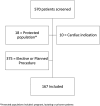Multicenter comparison of antiplatelet treatment strategies for urgent/emergent neuroendovascular stenting
- PMID: 37402388
- PMCID: PMC12475319
- DOI: 10.1177/15910199231180003
Multicenter comparison of antiplatelet treatment strategies for urgent/emergent neuroendovascular stenting
Abstract
BackgroundEmergent neuroendovascular stenting presents challenges for the utilization of antiplatelet agents.MethodsThis was a multicenter, retrospective cohort of patients who underwent emergent neuroendovascular stenting. The primary endpoints were thrombotic and bleeding events in relation to the timing of antiplatelet administration, route of administration, and choice of intravenous (IV) agent and the study investigated practice variability in antiplatelet utilization.ResultsFive-hundred and seventy patients were screened across 12 sites. Of those, 167 were included for data analysis. For patients who presented with ischemic stroke, artery dissection and emergent internal carotid artery (ICA) stenting who received an antiplatelet agent prior to or during the procedure, 57% were given an IV antiplatelet agent; for patients who were given an antiplatelet agent after the procedure, 96% were given an oral agent. For patients who presented for aneurysm repair and received an antiplatelet agent prior to or during the procedure, 74% were given an IV agent; patients who were given an antiplatelet agent after the completion of the procedure were given an oral antiplatelet agent 90% of the time. In patients who presented with ischemic stroke, artery dissection and emergent ICA stenting who received oral antiplatelet agents post-procedure were more likely to have thrombotic events compared to those who received oral antiplatelet agents prior to or during the procedure (29% vs 9%; p = 0.04). There were no differences in the primary outcomes observed when comparing other antiplatelet treatment strategies.ConclusionThe optimal timing of antiplatelet administration in relation to stent placement and route of administration of antiplatelet agents is unclear. Timing and route of administration of antiplatelet agents may have an effect on thrombosis in emergent neuroendovascular stenting. Significant practice variation exists in antiplatelet agent utilization in emergent neuroendovascular stenting.
Keywords: Ischemic stroke; aneurysm; platelet aggregation inhibitors.
Conflict of interest statement
Declaration of conflicting interestsThe author(s) declared no potential conflicts of interest with respect to the research, authorship, and/or publication of this article.
Figures
References
-
- Goyal M, Orlov K, Jensen ME, et al. A DELPHI consensus statement on antiplatelet management for intracranial stenting due to underlying atherosclerosis in the setting of mechanical thrombectomy. Neuroradiology 2021; 63: 627–632. - PubMed
Publication types
MeSH terms
Substances
LinkOut - more resources
Full Text Sources
Medical
Miscellaneous


